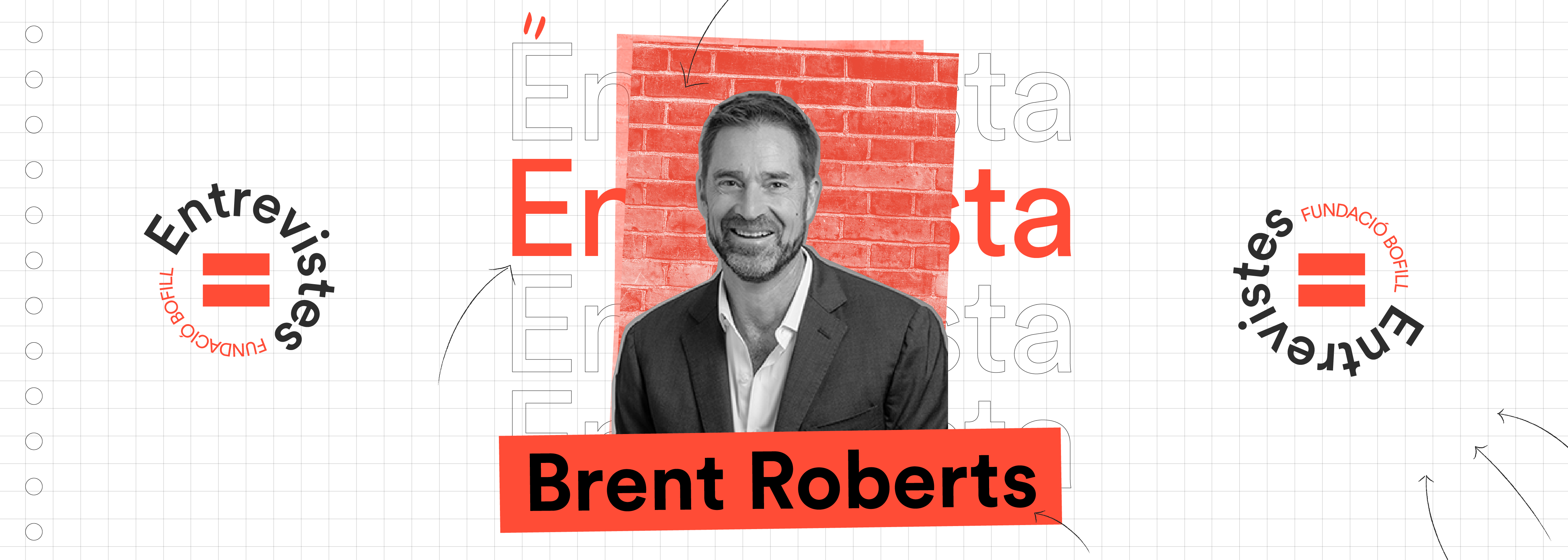“We invest a decade in educating children in technical skills. Social and personal skills deserve to be devoted the same amount of time”
01/03/2023

INTERVIEW
Brent Roberts is a professor of psychology at the University of Illinois and an OECD expert on socioemotional skills. He is known for his research on personality traits, especially conscientiousness and narcissism. In this interview, Roberts breaks some established ideas on personality construction. What’s more, he justifies the importance of socioemotional skills education for providing children and young people with tools for a healthy personal growth that has a positive effect on both their personality and social welfare.
It was long believed that personality traits are formed above all in the earliest years of life, while development and changes remained in the background. What does the recent research in this field of psychology have to say about this?
The research in the last three decades has revealed two transformative conclusions.
Firstly, even though childhood and adolescence are important in the formation of the personality, early adulthood is the critical phase of life for the development of the personality. The passage from adolescence to early adulthood holds hope for the development of the personality. This is when most of the systematic changes in the personality take place.
The second conclusion is that the majority of the systematic changes which occur during this transition are fairly positive for both the individual and society. People tend to become friendlier, more responsible, stronger and more emotionally stable, and all this is associated with better results in life.
“Early adulthood is the critical phase in life for the development of the personality. This is when most of the systematic changes in the personality take place.”
What margin exists for moulding the personality and, consequently, skills?
We still don’t know the exact answer to this question but we do have some indications from in-depth observational studies and from the most recent intervention studies, in which we try to change the personality. Basing ourselves on observational research, we see that most personality changes are relatively slow and incremental, accumulating over the course of years and decades – not days and weeks. What’s more, we don’t see individuals transforming their entire personality profile. People usually improve in one or two of the five dimensions, not in all of them, over the course of a decade. In the intervention work that we conduct, we see that we can speed up these changes and make them occur much more quickly. But we also see that we are still not radically transforming people. An intervention to enhance potential will probably make a student suffer less anxiety, but it’s hardly probable that it will succeed in turning an insecure student into a secure one, for example.
“We don’t see individuals transforming their entire personality profile. People usually improve in one or two of the five dimensions, not in all of them, over the course of a decade.”
What importance do social and personal skills have in a person’s development?
Skills are fundamental in allowing students, and people generally, to face the challenges that arise in their everyday life. Skills help us to deal with relations more effectively, both on the job and in our personal life. They help us to get and to hold on to a job, and to carry on a professional career. They help us to face the inevitable challenges that we come up against when things go bad. Skills like innovation and curiosity help us to become permanent learners, something that helps us in turn to learn at work and even when changing jobs. Skills like self-regulation can even help us to be physically more healthy and to live longer and better. The importance of social and personal skills for the good functioning of students in their lives should not be underestimated, and given their importance, they deserve as much attention as the technical skills on which we so often focus at school.
“The importance of social and personal skills for the good functioning of students in their lives should not be underestimated, and given their importance, they deserve as much attention as the technical skills on which we so often focus at school.”
Why may working on socioemotional skills lead to a substantial change in the course of adolescents’ lives?
I’ll give an example from a study directed by Terrie Moffitt. In that study, Moffitt and company discovered that the self-control of children was fundamental to their subsequent success in life, something which was reflected in higher income and better health. This success was explained in part by the fact that the children with greater self-control avoided falling into the traps of adolescence, such as starting to smoke, leaving school or having an unwanted pregnancy. And what is more important, Moffitt and company discovered that children who acquired a greater self-control from childhood to adolescence obtained better results, something which indicates that if we can help students to make their skills grow, it is less probable that they will take the wrong path at an early age and more probable that they will live a happier, healthier and more successful life as adults.
“If we can help students to make their skills grow, it is less probable that they will take the wrong path at an early age and more probable that they will live a happier, healthier and more successful life as adults.”
What factors in life are most closely involved in personality changes and what are the mechanisms that drive these changes?
It appears that most of these changes are related to the progress in success and in the conventional institutions appropriate to age. In the case of students, doing well at school is related to the increase of self-regulation. In the transition from adolescence to adulthood, the establishment of enduring satisfying relations is associated with an increase in emotional stability. The commitment and dedication to work are related to the increase of self-regulation and emotional stability. The outlook that may be glimpsed is hopeful from the standpoint that experiences count and that the prior personality of children is not by any means their destiny. On the other hand, the realities of childhood and adolescence pose serious challenges to adults’ attempts to foster these changes before they are appropriate for development.
Adolescents, for example, are more focused on creating ties with their peer groups than with the conventional institutions of adulthood. Pressuring adolescents to show more self-control when they are trying to be accepted by companions who will have nothing to do with self-regulation creates a personal conflict between students and the authorities in charge of their development. For this reason, in my opinion, it is justified to focus on skills rather than on a change of attitude. We can teach children and adolescents to self-regulate so that when the time comes and life demands it of them, they will have the capacity to act accordingly.
“It is justified to focus on skills rather than on a change of attitude. We can teach children and adolescents to self-regulate so that when the time comes and life demands it of them, they will have the capacity to act accordingly.”
Why do you conclude that there exists a “slight” continuity of the personality from childhood to adulthood?
Because if we look at the figures, the level of continuity between childhood and adulthood is fairly low. There is a strong tendency to think that the personality is genetic and, consequently, fixed from childhood. Or that what parents do to their children at an early age sets an unmoveable path to success or failure for them further on. The empirical figures simply do not support these suppositions. Children’s temperaments are only slightly related to their adult personalities, which means that if a genetic tie exists, it is a fragile chain in the best of all cases. What’s more, upbringing practices are only slightly related to the personality of children. The empirical reality is that children have lots of things to develop and that development requires lots of time. It’s not a question of downplaying the importance of parents in the life of their children, but rather of underscoring that the development of socioemotional skills is a long process that requires the involvement of everyone: parents, relatives, friends, teachers and communities. In this respect, social and personal skills are very similar to the technical skills that we value so highly. After all, we invest at least a decade or even more in educating children in technical skills. Social and personal skills deserve to be devoted the same amount of time.
“The empirical reality is that children have lots of things to develop and that development requires lots of time.”
Why do you conclude that personality traits preserve the possibility of change even in old age?
Because proof exists that personality traits change in adulthood and even in old age. People become emotionally more stable, even in middle age. Conscientiousness increases up to middle age and then appears to diminish when we retire. Lastly, whenever we have intervened to change social and personal skills, we have been able to do it in adolescents, young adults and people of middle age and older. Age does not appear to be a limiting factor for personality change.
“Age does not appear to be a limiting factor for personality change.”
What has led you to cooperate on PENTABILITIES?
I was acquainted with the work of Dr. Calsamiglia and I liked the PENTABILITIES project very much. What’s more, the chance to cooperate on a project to help students to improve their social and personal skills does not arise very often. The combination of being able to work with this team and on this project was an ideal opportunity that I couldn’t let slip by.
Would you like to find out more?
- Interview with Lídia Climent: “Educational support programmes can effectively reduce learning inequalities”
- PENTABILITIES. For the integration of socioemotional skills into the classroom, giving rise to important life skills
- EDUCATIONAL SUPPORT. Support to speed up educational opportunities
- YouTube - Playlist of #SuportEducatiu
